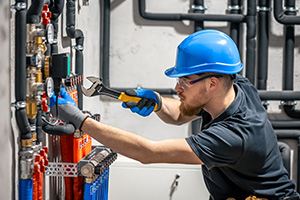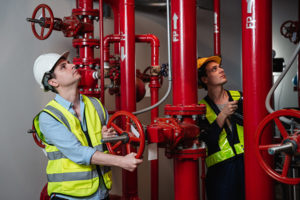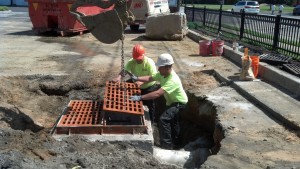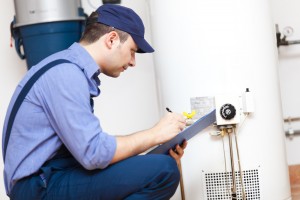 The plumbing industry is a vital part of our daily lives, ensuring safe and reliable water systems in residential, commercial, and industrial settings. Within this field, commercial plumbing jobs represent a specialized niche that focuses on large-scale installations and complex plumbing systems in buildings like hospitals, schools, offices, and shopping centers. As cities expand and businesses grow, the demand for skilled commercial plumbers continues to rise. In this post, we’ll explore what commercial plumbing jobs entail, the skills required, career opportunities, and tips on how to start or advance in this rewarding field.
The plumbing industry is a vital part of our daily lives, ensuring safe and reliable water systems in residential, commercial, and industrial settings. Within this field, commercial plumbing jobs represent a specialized niche that focuses on large-scale installations and complex plumbing systems in buildings like hospitals, schools, offices, and shopping centers. As cities expand and businesses grow, the demand for skilled commercial plumbers continues to rise. In this post, we’ll explore what commercial plumbing jobs entail, the skills required, career opportunities, and tips on how to start or advance in this rewarding field.
What Are Commercial Plumbing Jobs?
Commercial plumbing jobs involve installing, repairing, and maintaining plumbing systems in commercial and industrial settings. Unlike residential plumbing, which focuses on smaller and simpler systems, commercial plumbing requires expertise in handling larger, more complex systems. Commercial plumbers may work on high-capacity pipes, multi-level piping systems, and specialized equipment, ensuring that these systems meet local building codes and safety regulations.
A commercial plumber’s work ranges from installing toilets, sinks, and water heaters to setting up complex water and waste management systems for entire buildings. Tasks may also involve working with natural gas lines, fire sprinkler systems, and various drainage and venting mechanisms. Since these projects are generally more extensive than residential jobs, commercial plumbers often collaborate with construction teams, architects, and project managers to ensure that all systems are functional and safe.
Skills Required for Commercial Plumbing Jobs
To succeed in commercial plumbing, a specific set of skills and knowledge is essential. Commercial plumbers should possess:
- Technical Proficiency: A solid understanding of plumbing codes, blueprint reading, and various plumbing systems (water, waste, gas, etc.) is critical.
- Physical Stamina: Commercial plumbing jobs can be physically demanding, often requiring plumbers to work in tight spaces, climb ladders, and lift heavy equipment.
- Problem-Solving Skills: Every job brings unique challenges, from pipe blockages to complex leakages. Skilled plumbers need to diagnose and resolve these issues quickly and effectively.
- Attention to Detail: Ensuring safety and functionality in plumbing systems requires attention to detail, as even minor mistakes can lead to major issues in high-use commercial settings.
- Communication Skills: Commercial plumbers frequently work alongside other professionals, requiring clear communication to coordinate tasks, provide updates, and ensure the project’s success.
- Safety Awareness: Working with hazardous materials and heavy equipment requires strict adherence to safety protocols to protect oneself and others on the job site.
Many commercial plumbing jobs also require certification or a license, which varies depending on the region and level of work. Continuing education is often encouraged to stay current on plumbing innovations and industry standards.
Career Opportunities in Commercial Plumbing
Commercial plumbing is an in-demand trade, offering numerous career paths and growth opportunities. Some key roles include:
- Journeyman Plumber: After completing an apprenticeship and obtaining licensing, journeymen plumbers are qualified to perform hands-on plumbing work under minimal supervision. They typically handle both installation and repair jobs in commercial settings.
- Master Plumber: With more experience and additional certification, master plumbers are authorized to work independently and supervise other plumbers. They are often responsible for project planning, inspections, and ensuring compliance with codes and regulations.
- Foreman or Supervisor: Experienced plumbers may advance to supervisory roles, overseeing plumbing teams, managing schedules, and coordinating with other construction professionals.
- Project Manager: With further experience, some plumbers transition to project management positions, overseeing entire projects, budgeting, and ensuring timelines are met.
- Consultant or Inspector: Highly experienced plumbers may become consultants or inspectors, assessing commercial plumbing systems for functionality, safety, and adherence to regulations.
Job Outlook and Growth in Commercial Plumbing
The outlook for commercial plumbing jobs is positive. According to the U.S. Bureau of Labor Statistics, employment of plumbers, pipefitters, and steamfitters is projected to grow by 4% from 2022 to 2032, which is about as fast as the average for all occupations. This growth is driven by increasing demand for new commercial buildings, renovations, and the need for updated plumbing infrastructure in older structures.
With ongoing advancements in plumbing technology, such as water-efficient fixtures and smart systems, commercial plumbers with knowledge of the latest tools and technologies are particularly sought after. As the industry modernizes, skilled plumbers who can work with green technologies and automated systems will likely see even greater demand for their expertise.
How to Start a Career in Commercial Plumbing
To enter the field of commercial plumbing, aspiring plumbers generally follow these steps:
- Get a High School Diploma or Equivalent: Basic education is required, with courses in math and science being especially helpful.
- Complete a Plumbing Apprenticeship: Apprenticeships are essential, providing hands-on experience under the supervision of skilled plumbers. Apprenticeships typically last 4-5 years, covering both residential and commercial plumbing.
- Obtain Licensing: Most regions require plumbers to be licensed. Licensing typically involves passing an exam that tests knowledge of plumbing codes, safety protocols, and technical skills.
- Gain Specialized Training: As plumbers gain experience, they may choose to focus on commercial plumbing and receive additional training in areas like industrial piping systems, commercial plumbing codes, and advanced welding.
- Pursue Continuous Education: Staying updated on the latest industry standards, tools, and techniques can lead to better job opportunities and career growth.
Final Thoughts
Commercial plumbing jobs offer a challenging yet rewarding career path for individuals interested in working with complex systems and contributing to the infrastructure of communities. With strong demand for skilled commercial plumbers, this field provides job security, career advancement opportunities, and the potential for competitive earnings. For those willing to put in the time and effort, commercial plumbing can be a fulfilling and stable career with a positive outlook for future growth. Contact us for more information.
 The plumbing industry stands as a crucial pillar in maintaining public health, safety, and the overall comfort of society. With a broad spectrum of responsibilities, including the installation, maintenance, and repair of water supply, waste systems, and heating solutions, plumbers ensure our homes and buildings function smoothly. Beyond just fixing leaks or unclogging drains, plumbing encompasses a wide array of specialized jobs that cater to various needs, from residential repairs to the complex requirements of commercial and industrial facilities. This blog post aims to shed light on the diverse world of plumbing jobs, offering insights into the opportunities available for those interested in this essential trade. Whether you’re considering a
The plumbing industry stands as a crucial pillar in maintaining public health, safety, and the overall comfort of society. With a broad spectrum of responsibilities, including the installation, maintenance, and repair of water supply, waste systems, and heating solutions, plumbers ensure our homes and buildings function smoothly. Beyond just fixing leaks or unclogging drains, plumbing encompasses a wide array of specialized jobs that cater to various needs, from residential repairs to the complex requirements of commercial and industrial facilities. This blog post aims to shed light on the diverse world of plumbing jobs, offering insights into the opportunities available for those interested in this essential trade. Whether you’re considering a 
